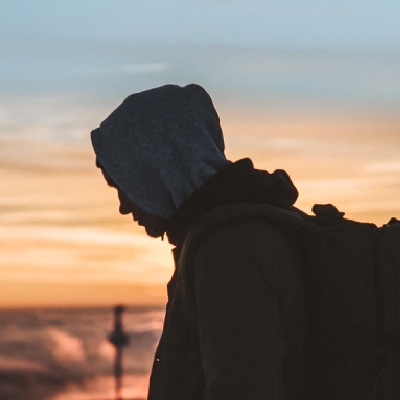Unhoused and Undersupported in Post-Camp Fire Chico, California

By Ashley-Michelle Papon, Project Coordinator, Development and Outreach, Migrant Clinicians Network
[Editor’s Note: This blog post comes from Ashley-Michelle Papon, Migrant Clinicians Network’s Program Coordinator in our Chico, California office. Papon provides a snapshot of life in Chico, where the trauma of the COVID-19 pandemic is amplified by the pre-existing trauma from the 2018 Camp Fire, which decimated nearby towns. Migrant Clinicians Network has supported frontline workers in the Chico area through our Witness to Witness (W2W) program. Learn more about W2W and access resources on coping with secondary trauma here.]
Jennifer Smith, a Kansas resident, knows firsthand what hardship is. The blind mother of three children with varying degrees of visual impairments, she had become accustomed to the frustration of feeling overwhelmed and underserved simultaneously. Yet in 2020, she found herself single, homeless, and grappling with a pandemic creating worldwide chaos. From the cramped hotel room she currently shares with her young children, she acknowledges that coping with the Coronavirus crisis has made everything more difficult, including finding more permanent housing.
“It’s been harder to find housing, harder to go look at housing, and we’re all stuck in one room together because no one’s in school anymore,” she explains. “Living in a hotel, it’s kind of a breeding ground for the virus, because there are so many people coming and going.”
While Smith confided a more permanent housing plan is in the works, and thus a move out of the most vulnerable echelon for contagion, the same cannot be said for other vulnerable people struggling to adjust to the landscape of living in a world trying to conquer COVID-19. Across the country in California, however, adjusting to the new world remains complicated by the stymied recovery efforts leftover from the old one. Nearly two years ago, the Camp Fire raced across half a dozen towns in Northern California’s Sierra Nevada foothills, killing at least 85 people and displacing more than 50,000 survivors. Less than 4,000 residents have returned, with approximately a quarter of survivors opting to leave the area completely. The majority have relocated to Chico, a college town where the foothills meet the Central Valley, and also the home of Migrant Clinicians Network’s West Coast office. Chico is now burdened with artificial housing scarcity, much to the chagrin of long-time residents.
“We are still fumbling along, untreated, almost two years later,” Jesica Giannola, a Chico area resident and business owner, says. “We were all hit with the Camp Fire in one way or another. All of us should have access to mental health services to help process that trauma, and yet there is no official funding or service that provides that resource. Without funding and providers available, we are left to try and deal with these emotions on our own, and that’s not always effective. To this day, people still suffer as if the event happened yesterday, and many have yet to find a place to put those emotions.”
Although Giannola did not live in Paradise, the epicenter of the Camp Fire, she has been a diligent force in assisting her friends and family with rebuilding efforts in the last year, including manually clearing the property of debris of the home belonging to her mother and sister. However, the fear of contracting and spreading COVID-19 amongst her clients and family has disrupted Giannola’s ability to participate, causing her to experience guilt and frustration related to the delay of helping loved ones create new homes. She also deals with residual anger and resentment at how the city of Chico has exacerbated the issue of housing, especially as it relates to the unhoused community.
“Zero commitment was made to alleviate the housing issue, even after it was clear that our homeless population had dramatically increased after the fire,” Giannola says, recounting the various friends and family members whose lives remain in limbo related to housing. “Those that are still without homes or temporary homes struggle, too.”
The number of those without homes is on the rise, according to Addison Winslow, a co-organizer with the Democratic Socialists of America’s Chico chapter. The members of DSA have received national attention for their collaborative mutual aid network, called North Valley Mutual Aid, which has focused on delivering groceries and other essentials to community members. Although the DSA does accept payment from those who can afford it, a number of clients are subsidy recipients, meaning they are unable to pay for the goods or the cost of delivering them. This is because many of them are without permanent housing.
“We have a lot more people living outside, and many are direct victims of the Camp Fire,” Winslow says.
Siana Sonoquie, a Chico resident who spent hours volunteering at the makeshift Red Cross shelter set up in the aftermath of the Camp Fire, sees that the local responsiveness to COVID-19, particularly for the unhoused, remains shaped by the trauma of the fire.
“I think that services are severely impacted because of the Camp Fire, due to the number of people who lost housing and stability when they lived in Paradise. All of these services don’t have enough room for everyone, so they can’t meet all the needs of the people. People who are unhoused are already facing major obstacles in getting access to adequate health care, for example. With COVID, you had multiple providers and businesses who just shut down services.”
Sonoquie, who is the Operations Lead for Safe Space Winter Shelter, a nonprofit that provides low barrier housing during the cold months and recently collaborated with other community stakeholders to open Project Roomkey to temporarily help locals ride out COVID-19, also sees parallels between those who were hardest hit by the fire, and those most at risk for contracting COVID-19 now.
“I feel like we watched the system completely set up to let certain people fall through the cracks; namely, the poor, the disabled, and people of color,” she says. “And with mobile and migrant populations like these, there are often language barriers. There are some folks in our unhoused populations that are migrants, meaning that they have green cards, but maybe they got in trouble with the law, and now they’re just living in a complete limbo under the radar while waiting for our social service system. There’s a lot of having to be quiet about life.”
Life may have grown quieter for the migrant and mobile population of Chico’s unhoused, but some advocates attribute this to business as usual amongst the most vulnerable members of society. Community advocates report that incidents of violence and harassment against the unhoused community have increased dramatically in recent months. Tragically, violence is often a common bedfellow for those without homes, according to Sonoquie.
“So many of our guests have trauma, at all levels,” she explains. “It isn’t just trauma at one part of their lives. It’s chronic and constant throughout their lives.”
The sheer magnitude of their lived experiences has made “the thought of contracting a potentially fatal disease just too overwhelming to process,” suggests Robyn Engel, a licensed clinical social worker. “COVID-19 has caused a big spike in anxiety and depression here.”
For the unhoused, Engel explains, “While incredibly resilient, they’re also woefully used to living in complicated, chronic trauma. Coronavirus represents yet another incomprehensible catastrophe. Every day, every minute, is a struggle for survival.”
The struggle continues for many of the residents of Butte County, despite outward indicators of time marching on. On June 16, Bill Johnson, the Chief Executive Officer for Pacific, Gas, and Electric, the San Francisco-based utility company ultimately responsible for Camp and several other notoriously destructive wildfires in California over the last two decades, pleaded guilty to 84 individual counts of involuntary manslaughter and an additional felony count of unlawfully starting a fire. The hearing involved reciting the names of the 85 confirmed fatalities of Camp, as well as Johnson reading a statement addressing the victims still living.
Giannola, echoing the sentiments of the broader community, remains unimpressed by PG&E’s mea culpa, describing the settlement as “a slap in the face of victims,” many of whom continue to suffer in the present.
A blistering report from the grand jury assessed the utility company’s “callous disregard” for life and property due to faulty maintenance, failure to comply with state regulations, and neglect of multiple warnings about the age of its power lines. The judge ordered the embattled company, which filed for bankruptcy protection last year, to pay more than $10 billion to the Camp Fire plaintiffs.
Angela McLaughlin, a member of the executive team of the Greater Chico Homeless Task Force, regards the settlement terms with a cap on affordability as “pragmatic,” but still incomplete, especially where the migrant and mobile unhoused community is concerned.
“Nothing will fix this, no amount of money,” she says. “With COVID, the challenges have worsened yet again. Most providers are not accepting new people into the shelter, at least not without quarantining them for two weeks first, and realistically, where can they be quarantined? They don’t qualify for most aid programs, so their circumstances are further reduced from an already dismal state.”
In addition to taking responsibility on behalf of PG&E, Johnson’s words may just encapsulate the permeating sense of things left unfinished for Butte County’s mobile and migrant populations: “They’ve described the loss they’ve continued to endure and the wounds that can never really heal.”
Like what you see? Amplify our collective voice with a contribution.
Got some good news to share? Contact us on our social media pages above.
Return to the main blog page or sign up for blog updates here.
- Log in to post comments

